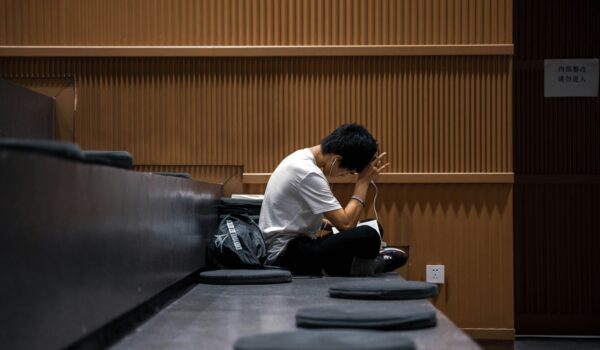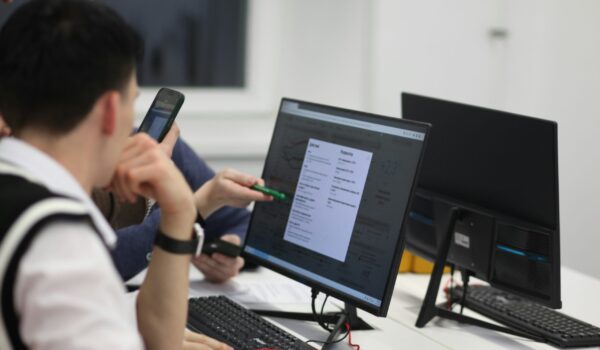
Being a Healthy Student While Stuck at a Computer
 Being a healthy student is something that comes naturally to us when we are younger. During elementary and high school, so much of our lives seem devoted to play and exercise (and at the very least, we have designated exercise periods that are mandatory parts of the curriculum), most young people just automatically figure they are in good health. Once you hit university however (and it only gets more difficult after), staying healthy while meeting the demands of school and personal/work life can take a toll on your health.
Being a healthy student is something that comes naturally to us when we are younger. During elementary and high school, so much of our lives seem devoted to play and exercise (and at the very least, we have designated exercise periods that are mandatory parts of the curriculum), most young people just automatically figure they are in good health. Once you hit university however (and it only gets more difficult after), staying healthy while meeting the demands of school and personal/work life can take a toll on your health.
This is even more true in the digital era, where so much of our time is spent, and so much of our work involves sitting in front of a computer screen for hours at a time. All of this sitting and staring is not what human beings, or the human body were meant to do. It’s not good for us, and in order to compensate for all of this we need to be sure we are protecting and fortifying our bodies as well, or health concerns might replace academic concerns in due course. Below are some tips on how to stay healthy as a student, despite the fact that you are sitting and looking at a screen all day.
Light settings for healthy eyes
There is likely not a person in the world who uses a computer on a regular basis who hasn’t, at some point, experienced both dry and sore eyes, as well as, perhaps, headaches, as a direct result of too much screen exposure. But it is not just the fact that you are sitting and staring at artificial light; it’s the kind of light you are constantly exposed to. When you sit and stare at a computer screen (or really any kind of flat, or LED screen) you are looking at blue light.
Blue light is the same wavelength of light that we get from the sun and, in moderate, controlled doses, it is good for us. Blue light from digital devices, however, and can end up causing eye strain, and some studies have shown that prolonged exposure to blue light can even lead to retina damage over time.
If you want to save your eyes while you are working on your laptop or school computer, go into the settings and change the light composition. You can do this on almost all new computers. There is a slide you can play with that lets you increase or decrease the amount of blue light you are seeing, and if you make the light warmer (i.e. less blue), you will notice an immediate difference.
Take frequent breaks to stand up and walk around
A healthy student, and a healthy person in general, is someone who takes frequent breaks to stand up and walk/move around. Much of academic life, when it is not spent shuffling to and from class, is spent sitting in front of a screen, or with a book or paper, contemplating, writing, and thinking. While you can do all of these things standing up, most people do them sitting down, often slouched in a chair, on a couch, or in one’s bed. What’s worse, they are often done while dehydrated, and after having consumed food and drinks that only add insult to injury.
If you are reading, writing, or studying for long periods of time in front of a screen, you have to take frequent breaks to stand, walk, stretch and relieve some of the pressure on your joints and internal organs. This could be as simple as getting and taking a 10 minutes walk around your building, doing some push ups, using a chin-up bar you’ve installed, doing some jumping jacks, even just walking to the kitchen to make yourself a cup of tea. The potential health effects of a largely sedentary lifestyle are well-documented, and they are not good.
Have an exercise routine
The key to a balanced lifestyle is everything in moderation, including exercise. While it is not always feasible to have a daily exercise routine, it is entirely possible to work exercise into your week at least a couple of times. Being a healthy student, while requiring some effort, is within the grasp of most people (barring some sort of health condition that is out of your control). Most campuses have at least one gym, and perhaps several sports and exercise facilities that you are allowed to take advantage of as part of your tuition fees. You should use them.
Not only is exercise good for us physically, but it has also been shown to be good for us mentally. Even a little bit of exercise, in fact, can have a significant positive effect on our happiness and overall outlook on life. This could mean going for a run a few times a week, taking an exercise class a couple of times a week, going for a hike, or even just an extended long walk. If you still find that your understandably busy schedule is not allowing you to find time to take care of your mind and body, consider a professional essay writing service to help free up some time and get you a great mark at the same time.
Staying healthy throughout our adult lives is something that increases in difficulty the more responsibility we take on. As you progress through university, into your career, think about possibly starting a family, etc. your health can fall by the wayside – something which only increases in potential severity the older you get. You don’t want to find out that you’ve been too neglectful of your health at a point in your life when it is harder to make a comeback.
If you are serious about remaining a healthy student while you are at university, then keep the above tips and considerations in mind, and if you still need some help freeing up some healthy you time, contact Homework Help Global and let a professional essay writer help free up some ‘you’ time.
References:
(2019). “Blue light and your eyes.” Prevent Blindness. Retrieved from: https://www.preventblindness.org/blue-light-and-your-eyes
Reynolds, G. (2018). “Even a little exercise might make us happier.” New York Times. Retrieved from: https://www.nytimes.com/2018/05/02/well/move/even-a-little-exercise-might-make-us-happier.html
Share:

